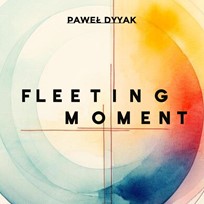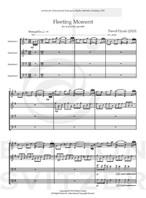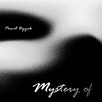
Fleeting Moment
Composer: Paweł Dyyak
Instrument: Marimba (5.0 Octave)
Level: Intermediate
Published: 2023
Price: €45.00
Item details
-
Description +
-
Fleeting Moment is a piece for a quartet playing one marimba. The composition is based on classical harmony. A bright, pure work with a bit of drama in the middle section. The most important thing in the piece is the collaboration between the performers. They often have to work in pairs, because their parts complement each other or form one whole. The key element in the piece is the sixteenth note triplet, which most often announces the beginning of the motif, and gives the whole composition a fleeting character.
Fleeting Moment is very lyrical, which gives the performers an opportunity to show their musical sensitivity and convey a lot of emotions.
I’m glad that I had possibility to compose this piece specially for IKKMA which in 2023 took place in Gdańsk, and I would like to express my special thanks to Ms. Katarzyna Myćka.
- Paweł Dyyak
-
-
Instrumentation +
-
For four players on one Marimba
-
-
Watch+
-
Performed at the 10th edition of IKMMA 2023
-
-
About the composer +
-
Paweł Dyyak was born in Kraków, Poland in 2000. He graduated the Ignacy Jan Paderewski Primary Music School and Fryderyk Chopin Secondary Music School in well known Kraków percussion teacher Mr. Leon Olejniczak. In June 2022, he graduated Bachelor in percussion at the Karol Szymanowski Academy of Music in Katowice, where he continues his studies in the class of prof. Krzysztof Jaguszewski. Paweł Dyyak is a laureate of many competitions, e.g. in Poland, Germany, Kazakhstan or Russia. He is also a two-time scholarship holder of the Polish Ministry of Culture.
One of his favorite forms of professional activity is chamber music. Together with Jakub Kołodziejczyk, they have been creating the Marimbazzi Duo since 2015. It is one of the most valued and awarded Polish percussion bands of the young generation. So far, they have won twenty-five awards at various chamber music competitions in Poland, Italy, Andorra, France, Kazakhstan, among others, the largest of which are Grand Prix at the National Music Competition of the Center of Artistic Education, I Premi on IV Concurs International Cambra Romanica in Andorra, Primo Premio ex aequo on “Salieri-Zinetti” International Chamber Music Competition in Italy, 1st Prize on VIII International Contemporary Music “Srebrna Szybka”:Competition in Krakow and 1st Prize on International Percussion “Drum Fest” Competition in Opole.
The ensemble performed at a number of festivals and concerts in Poland and abroad as well.
For more information, please visit the website of the composer and the Marimbazzi ensemble. www.marimbazzi.com
-
-
Reviews +
-
Review (Percussive Notes, June 2024)
“Fleeting Moment” is composed for four players on one 5-octave marimba, with each part requiring two-mallet technique. It makes for a great technical study in that each performer is required to perform scalar, arpeggiated, and double-stop figures as well as numerous dynamics and several key changes. Although the time signature doesn’t change from 12/8, there is a lot of rhythmic interest and interplay among and within the parts. It is also nice to find a marimba quartet where all the parts are equal in difficulty.
The musical material is based on Classical harmony. A sixteenth-note triplet figure and 2:3 polyrhythm provide clear motivic coherence throughout the work. There is ample room for musicality and much opportunity for chamber music, including the division of certain passages into groups of two players with complementary parts. I recommend “Fleeting Moment” for performers looking to challenge their two-mallet skills in a Classical context.
—Joseph Van Hassel
-
-
Credits +
-
Front Cover graphics and layout: Nicola Lee
Photo: Rafał Korzeniowski
Printed in Copenhagen, Denmark
Copyright © Edition SVITZER
www.editionsvitzer.com
-

